May 16, 2025 | 17:23 GMT +7
May 16, 2025 | 17:23 GMT +7
Hotline: 0913.378.918
May 16, 2025 | 17:23 GMT +7
Hotline: 0913.378.918
According to research by Dr. Nguyen Van Sanh (Can Tho University), in terms of pricing in the high-quality rice segment, Vietnamese rice, in general, and that from Tien Giang, in particular, ranks just behind the U.S and is priced higher than that of other exporting countries. The long-grain, aromatic white rice of Tien Giang has advantages over Indian and Thai rice.
Research by Dr. Le Quang Khoi, Director of the Tien Giang Department of Science and Technology, indicates that the province has many quality rice varieties that are well-suited for adaptability, yield, and quality, reinforcing the previous assessment. The advantages include varieties like Nang hoa 9, OM 5451, OM 4900, and especially the VD20 variety, which has been successfully revived through cooperation between the Department of Science and Technology and the Tien Giang Center for Agricultural Promotion and Services.
This is one of the few specialty rice varieties that can adapt to harsh weather conditions (with good resistance to drought and salinity) while producing high-quality, fragrant, sticky, and delicious rice that meets consumer preferences. Typically, the price of VD20 rice is VND 1,000/kg higher than that of other rice varieties.
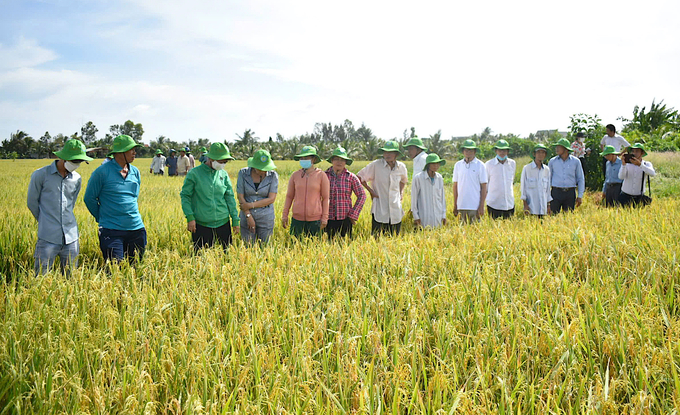
Farmers of Go Cong is observing the IPHM-applied rice production model.
Recognizing that building a brand will enhance the value of rice products for businesses and localities, the HK Trading Company has actively accompanied farmers in implementing this initiative. Mr. Chau Minh Hai, Director of HK Trading Company, stated that VD20 Go Cong rice is a product the company has been passionate about since its establishment. This is a specialty rice from Tien Giang, produced in the Go Cong region. The VD20 rice product was certified as a 4-star OCOP product three years ago and has recently been re-certified.
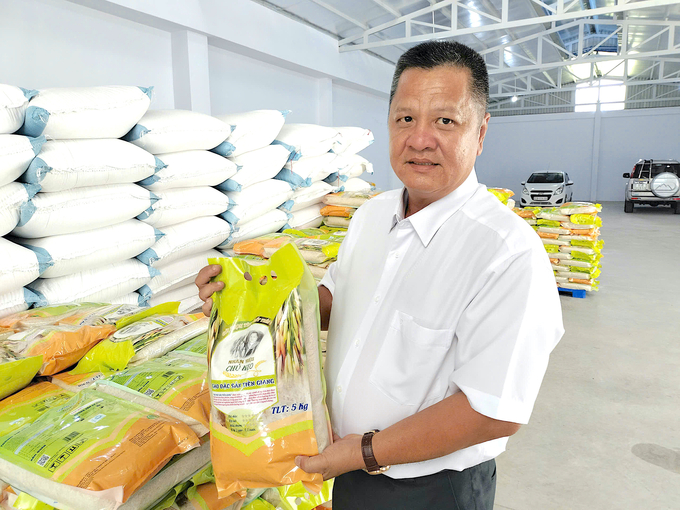
Mr. Chau Minh Hai, Director of HK Trading Company, introduced the VD20 rice, a specialty of Go Cong.
According to Mr. Chau Minh Hai, the VD20 Go Cong rice brand has become well-known and favored by many consumers. The company is currently aiming to export VD20 Go Cong rice to international markets. The area of raw material for producing VD20 Go Cong rice is currently over 500 hectares, and with this production capacity, the business is ready to export. Therefore, the company is striving for the product to achieve 5-star OCOP certification.
"The current limitation of the product is that it has not yet met export criteria. In the near future, the company will visit some countries to promote the product to address the unmet export criteria, aiming to achieve 5-star OCOP recognition", Mr. Hai added.
Scientific recommendations
According to the Department of Agriculture and Rural Development, the province is implementing many programs, plans, and projects to develop rice, such as: the project to establish "High-tech rice production areas from 2018 to 2020 and the orientation until 2025", the project "Crop restructuring, changing the seasons, and planting structure in the eastern districts of Tiền Giang until 2025", and the plan "Developing agriculture using science and technology, high technology, and organic farming from 2022 to 2025, with a vision to 2030".
The province is also implementing the project "Sustainable development of 1 million hectares of high-quality, low-emission rice cultivation linked to green growth in the Mekong Delta until 2030," contributing to increasing the value of rice.
Overall, rice production in the province is becoming increasingly sophisticated, with quality and profit rising. In the last five years, rice yield has increased by 1.2 to 2.2 quintals per hectare, coupled with higher rice prices, resulting in an increase in profit from rice production of about VND 15 million per hectare compared to five years ago.
However, according to scientists, several policies need to be strengthened, including market policies and investment appeals. This policy focuses on expanding market competition, attracting investment in deep processing, upgrading wholesale markets, and enhancing e-commerce. The policy emphasizes upgrading the value chain by establishing large-field models according to the 2024 Land Law. This policy highlights the importance of developing raw material regions and organizing production according to the advantages of these regions, involving the four stakeholders: the government, farmers, businesses, and scientists to enhance the value chain.
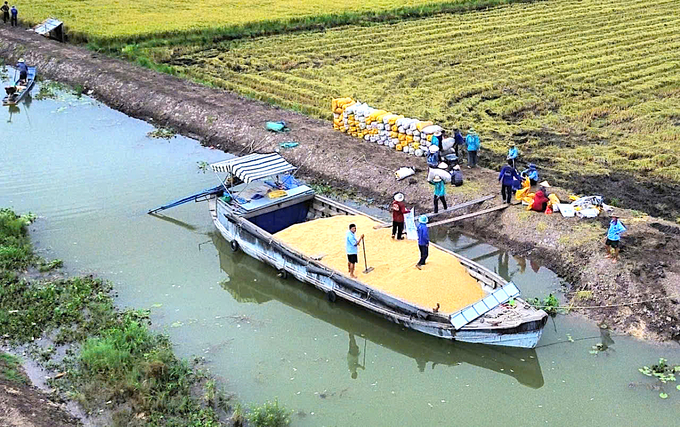
Merchants buy rice at Go Cong.
Additionally, other policies include scientific and technological policies, innovative development of food and agricultural technology, policies for developing economic models from the rice industry, and policies to mobilize human resources through public investment participation.
Furthermore, Dr. Thach Phuoc Hung from the Institute for Research and Consultancy on Mekong Delta Development (HCMC University of Economics) noted that Tien Giang faces logistics bottlenecks with high costs, limited infrastructure and services, and weak human resources. Therefore, higher education institutions need to invest in teaching so that graduates can meet the urgent demand for logistics human resources.
Dr. Bui Van Hoai from HCMC University of Industry also mentioned that he is researching technological solutions to enhance the value of rice through the production of fast food from rice, such as nutritional rice, instant rice, functional rice, and instant noodles.
Mrs. Dao Thi Thanh Xuan from the Import-Export Department emphasized that future solutions need to continue implementing the restructuring project for rice according to Decision 555 by the Ministry of Agriculture and Rural Development and Decision 1490 by the Prime Minister regarding the sustainable development of 1 million hectares of high-quality, low-emission rice cultivation, supporting traders in tracing product origins, and utilizing benefits from trade agreements that Vietnam has signed.
Sharing experiences, Mr. Huynh Ngoc Ho, Deputy Director of the An Giang Department of Industry and Trade, stated that rice produced in An Giang has penetrated potential markets in European and Middle Eastern countries. An Giang is applying digital technology for traceability. This technology helps better manage the supply chain and use e-commerce platforms to access large international markets, reducing intermediary costs and delivering products to the best-priced markets.
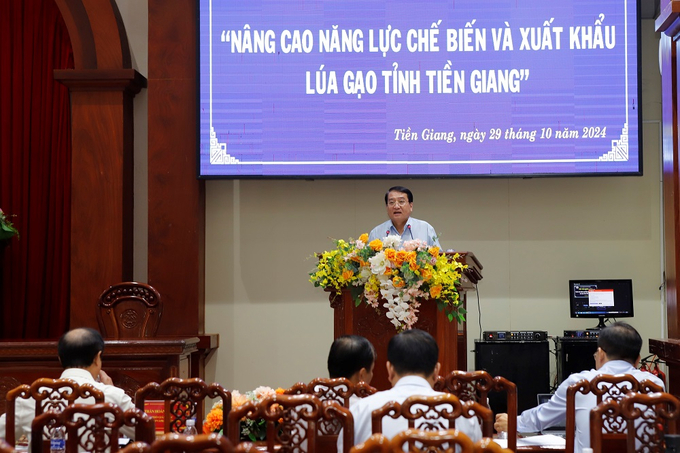
Mr. Pham Van Trong, Deputy Chairman of the Tien Giang Provincial People's Committee, stated that relationships among the four parties: the government, businesses, farmers, and scientists need strengthening.
Mr. Pham Van Trong, Deputy Chairman of the Tien Giang Provincial People's Committee, expressed gratitude for the contributions of scientists and researchers in helping Tien Giang develop its rice industry sustainably. He mentioned that the area for rice production in Tien Giang is becoming increasingly fragmented. In the past, the province did not prioritize registering for international standards and intellectual property, achieving some standards without maintaining them.
However, regarding processing and consumption, Tien Giang now has a centralized area for processing rice for domestic and export markets located in Cai Be. Many businesses are increasingly investing in modern and efficient technologies. Businesses are becoming more dynamic and professional. Recently, the stable rice prices have brought joy to the farmers.
In the near future, he believes that it is necessary to enhance market information for rice; promote digitalization of electronic markets; and increase conveniences. Notably, strengthening the relationships among the four parties: the government, businesses, farmers, and scientists is essential to develop production to meet the growing demands. Businesses need to research and apply science and technology, while departments and agencies need to have policies to support businesses in accessing loans and storing rice.
Translated by Kieu Chi

(VAN) Vietnam’s TH Group officially put its high-tech fresh milk processing plant into operation in the Russian Federation, marking a historic moment as the first TH true MILK cartons were produced in Russia.

(VAN) Use of high-quality broodstock and biotechnology is regarded as the most effective approach to ensuring sustainable and economically viable shrimp aquaculture ahead of climate change and the emergence of increasingly intricate disease patterns.

(VAN) Carbon farming is a form of agricultural practices that helps absorb more greenhouse gases than it emits, through smart management of soil, crops, and livestock.

(VAN) This is a key content of the Memorandum of Understanding recently signed between the Vietnam Fisheries Society and Kunihiro Inc of Japan.

(VAN) To achieve the goal, local authorities and businesses in Kon Tum province have fully prepared the necessary conditions for the new Ngoc Linh ginseng planting season.
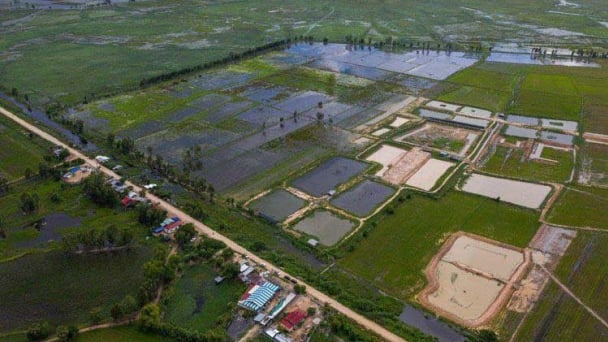
(VAN) Jiangsu province is gearing up to host training programs in Phnom Penh, the capital of Cambodia, this year to establish the Fish and Rice Corridor.
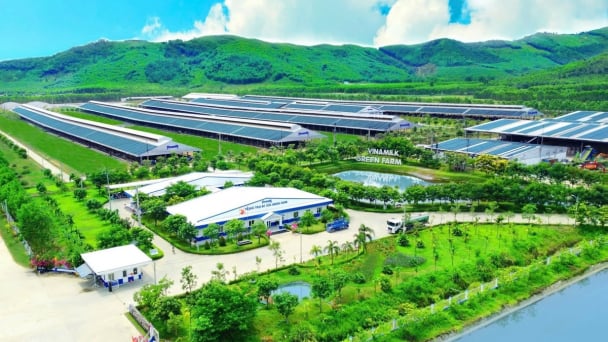
(VAN) Le Hoang Minh, representing Vinamilk, shared the company's experience in energy saving and green energy transition for production at a workshop held during the P4G Summit.